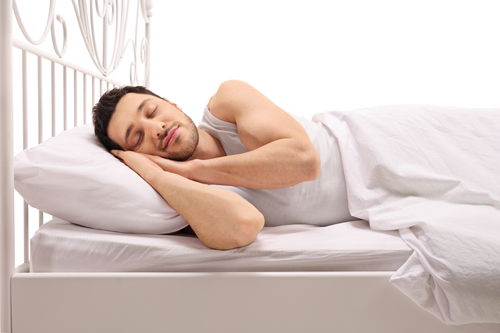What’s The Best Way to Floss
We all know we should floss, but it can be tough. Part of this is because flossing can feel like an extra task in an already busy day, but it...

If you’re waking up in the morning feeling groggy and tired from yet another sleepless night, you are not alone. Approximately 18 million Americans suffer from sleep apnea. Your oral health could be the reason behind your snoring and sleep disturbances, leading dentists to often discover untreated sleep apnea before general physicians.
Here are six signs of sleep apnea that your dentist can spot during your bi-annual exams.
The first indication of sleep apnea is teeth grinding. Bruxism, or teeth grinding, has been directly linked to patients suffering from sleep apnea in many studies. Those with undiagnosed obstructive sleep apnea have a tendency to clench their jaws and grind their teeth at night while they sleep. Many are completely unaware of their teeth grinding habits until a dentist brings the issue to light.
An increase in muscle activity in the jaw as a result of sleep apnea may be the cause for teeth grinding. The surfaces of your teeth begin to wear down and become flat over time from clenching or grinding.
If sleep apnea continues to go undiagnosed for an extended period, teeth grinding will cause the surfaces of your teeth to become worn. Teeth that have been worn down leads to the structure of a tooth becoming fragile and easily broken.
One of the significant causes of gum recession is habitual grinding of the teeth at night. If you’ve started to notice your gums pulling away from the teeth, schedule an exam with your dentist as soon as possible.
Damage to the bone and soft tissue in your gums can cause your gum tissue to swell, bleed, recede, or become inflamed.
Cavities are more likely to develop if you’re suffering from sleep apnea. The teeth grinding motion causes your tooth enamel to wear down, which makes the surfaces of your teeth more susceptible to cavity-causing bacteria. Harmful bacteria leads to tooth decay which causes cavities.
You’re Overly Tired. Pauses and interruptions in your sleep result in not only a loss of quality sleep but a reduction in the actual hours of sleep you are getting each night.
Waking With Headaches. Frequently not getting enough oxygen to the brain can cause vascular headaches. Along with excessive daytime drowsiness, headaches are a common symptom reported by sufferers of sleep apnea.
Snoring. Chronic snoring is one of the most frequently cited symptoms of sleep apnea. A partial blockage or obstructions causes snoring as air is restricted from moving efficiently through the airways of your upper respiratory.
Frequent Breaks or Pauses in Breathing. Obstructive sleep apnea causes the fatty tissues of the throat or tongue to become relaxed during sleep and fall back into your airways. Restricted airflow causes you to stop breathing for a few seconds. The oxygen levels in your blood drop, causing your brain to wake itself from sleep.
Sleep apnea can be extremely dangerous. Shallow breaths and temporary pauses in your breathing while you sleep may only last for a few seconds, but they can occur 30 times or more in a one-hour period. When your breathing is interrupted, your body reacts by increasing your heart rate to maintain proper oxygen levels. Over time, this will increase your risk of developing health issues including high blood pressure, heart disease, and stroke.
If you’re experiencing any of these signs of symptoms of sleep apnea, schedule an exam with Hoffman Dental Care today so we can create the best treatment plan possible for your sleep apnea struggles.